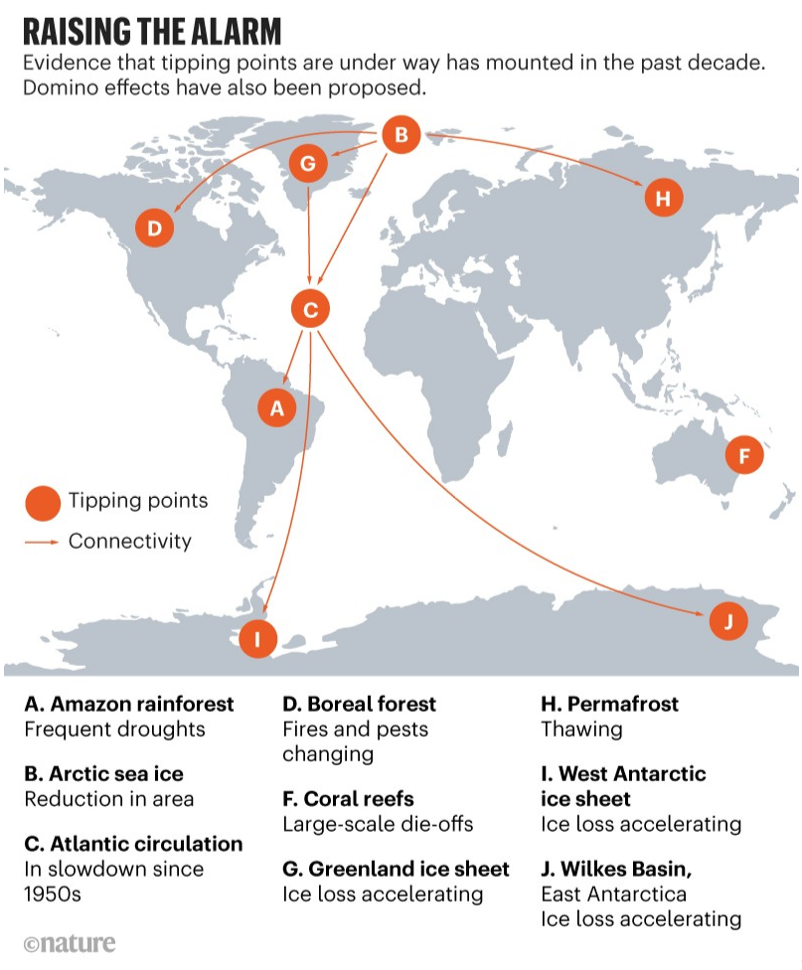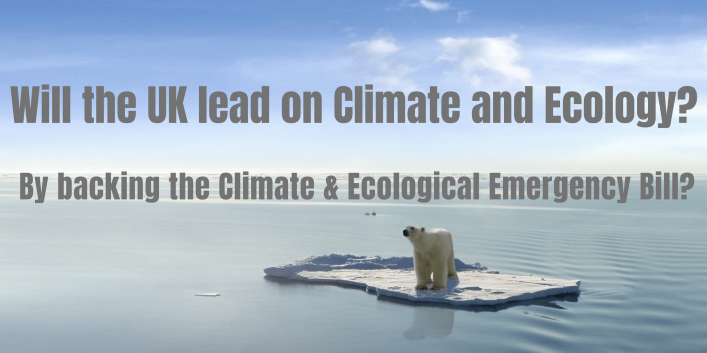By Natalia Hayes
The event Will the UK lead in climate and ecology? co-hosted by Transition Exeter, the Global Systems Institute at the University of Exeter, and New Prosperity Devon, was a reminder about how revivifying it can be to share a space with so many others who feel as passionately as I do about the need for rapid human action in order to protect the planet that we know and love. It was also an opportunity to be reminded about the seriousness of the climate and ecological crisis and about what can and must be done to meet the targets laid out by the science in order to overcome it.
We were given the opportunity to hear from 3 incredible speakers: Professor Tim Lenton, Earth System scientist discussed global tipping points and the need for urgent action, Harry Barton, CEO of the Devon Wildlife Trust, who called for a Nature Recovery Network and reduction in the poisoning of land with pesticides; and Sarah Lunnon, representing the CEE Bill Alliance, who stressed the importance of the Climate and Ecological Emergency Bill currently in limbo with the suspension of Friday sittings in Parliament.
Whilst all three speakers displayed how UK action is failing in its response to the emergency (outlined below), I strongly believe that this is not the time to accept defeat, and if you are looking for where your energy would be best spent, pushing for the CEE Bill to become legislation is a good place to start.
Here are some of the main points to come out of the event:
CLIMATE & CLIMATE TARGETS
TIPPING POINTS
We are edging towards a number of tipping points that will trigger irreversible changes to the climate, crossing the boundaries needed to stabilise the biosphere and all life support systems in it.
There is also mounting evidence that nearing one tipping point can trigger others, as for example the melting arctic sea ice results in the absorption of more heat from the sun, melting permafrost and methane release, and increased fires and pests in northern forests. This in turn can lead to an even greater acceleration of these changes. Passing even one tipping point will make planetary conditions for both human and non-human life extremely challenging.
1.5 DEGREES & EMISSION BUDGETS
The planet therefore must be kept below 1.5 degrees in order to avoid triggering tipping points. And to do this, we must commit to 10-15% year on year reductions in carbon emissions to prevent irreversible changes to the climate.
A snippet from the article that Lenton wrote with Johan Rockström and others, helps to put this into perspective.
“The world’s remaining emissions budget for a 50:50 chance of staying within 1.5 of warming is only about 500 gigatonnes (Gt) of CO2. Permafrost emissions could take an estimated 20% (100 Gt CO2) off this budget and that’s without including methane from deep permafrost or undersea hydrates. If forests are close to tipping points, Amazon dieback could release another 90 Gt CO2 and boreal forests a further 110 Gt CO2. With global total CO2 emissions still at more than 40 Gt per year, the remaining budget could be all but erased already.”
To put this in even more perspective, Tim Jackson in Climate Alliance’s COP26 video (first 4.5 minutes) explains that the UK has a carbon budget of 5 billion tonnes left in order to meet its share of the responsibility to stay below 1.5 degrees. With an existing average expenditure of 600 million tonnes per year, the UK would need to be Net Zero by 2025. It’s worth watching the full 20 minutes if you have time. More on carbon budgets here.
POSITIVE TIPPING POINTS
It is not all doom and gloom however. Prof. Lenton advises that positive tipping points of transformation can be achieved. This can sometimes be seen through the reinforcing feedbacks of innovation, as in Norway, where the adoption of Electric Vehicles has spread through social contagion like an epidemic, with government support and the price of electric cars now matching that of petrol/ diesel. The same can be said for power generation in the UK, with the rapid reduction in the use of coal power from 40% to 1-2 % over an 8 or 9 year period. All of which suggests that bottom-up initiatives and top-down policies can and are already beginning to tip rapid decarbonisation.
BIODIVERSITY LOSS IS ACCELERATING
Harry’s points were equally hard hitting. For instance, he advised that one quarter of UK wildlife species have gone. Extinction rates are 8 times faster in insects due to a combination of pesticides, climate change and human activity. Toxicity of pesticides has increased 6-fold with area of use and frequency of use doubling in the last 25 years. For more on pesticides and the need for government action see Harry’s response to the January decision to allow a hitherto banned pesticide on sugar beet.
NATURE RECOVERY NETWORK TARGETS VS. CURRENT GOVERNMENT TARGETS
The government seeks to increase wildlife habitat on land and at sea by 4% from 13%. This is not enough. The Nature Recovery Network seeks to bring back Britain’s wildlife and sees a 30-40% increase as essential.. Investment in the growth and protection of our natural habitats is estimated to cost a mere £3 billion in comparison to the government’s investment of £27 billion in road building and £100 billion in the HS2 rail project.

David Attenborough argues for a legally binding target to reverse nature decline by 2030, a case which Harry Barton takes up here, with a hint for action. “Putting the Nature Recovery Network centre stage. It’s great to see the Nature Recovery Network mentioned in the [CEE] Bill, but it won’t become a reality unless the Local Nature Recovery Strategies that underpin them have real power to influence government, planning and spending decisions.”
WHY IS THE CEE BILL SO IMPORTANT?
This Bill:
- Acknowledges a rapid decarbonisation plan is needed and makes climate and ecological targets legally binding;
- Measures the climate impact of UK’s consumption, including imports, not just what goes on within our territory
- Seeks to use levers of government power that already exist to protect the future of life on earth.
- Provides a through route for government to take action. A Citizen’s Assembly which mandates action can hold government accountable whilst tackling the democracy deficit in our country.
FURTHER INFORMATION
A 2 minute explanation: https://www.youtube.com/watch?v=VrqyrM2X_KA
A longer 20 minute explanation: https://www.youtube.com/watch?v=tZULh59s3mg&t=68s
Caroline Lucas video: https://www.youtube.com/watch?v=H_jDePkTrPU
Take action by:
Writing to your MP
Writing to your Devon County Councillor before the CEE Bill support motion comes up on 29TH April – details and template here
YOU CAN WATCH THE EVENT ‘WILL THE UK LEAD ON CLIMATE AND ECOLOGY’ HERE:
This blog post is by Natalia Hayes, an active member of Transition Exeter

